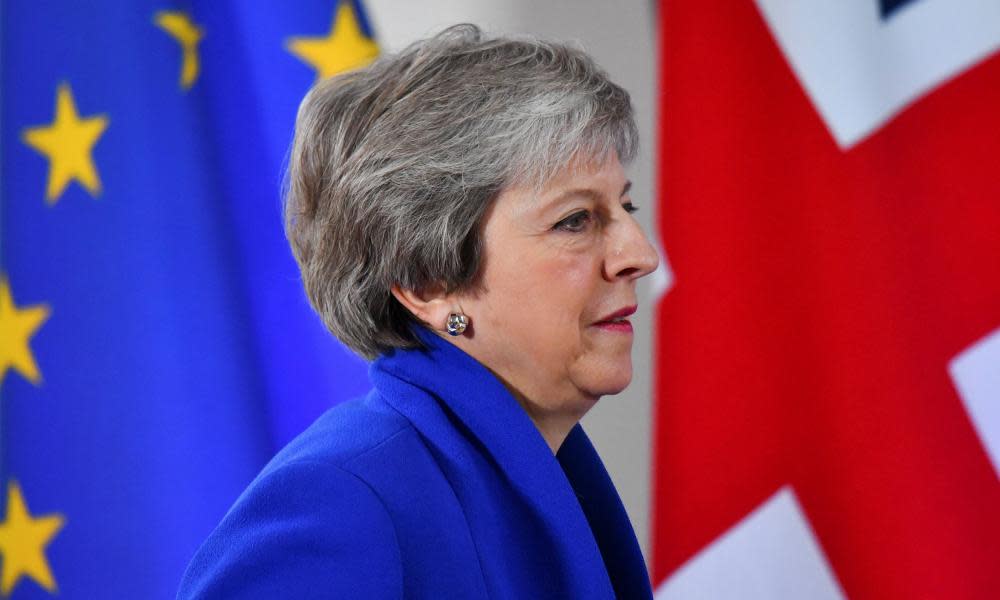EU to hold emergency no-deal talks if MPs vote down Brexit deal

Theresa May is expected to have to delay her arrival at the next EU summit if parliament votes down her Brexit plan, to allow the bloc’s 27 leaders to hold emergency talks and trigger their no-deal preparations.
MPs are on track to reject the prime minister’s deal just two days before the next meeting of heads of state and government in December.
While there will be a clamour in the UK for the prime minister to start renegotiating in Brussels, senior EU sources suggested leaders would be loth to hold any such talks with May at the summit starting 13 December.
The EU is instead likely to request that May comes to Brussels on 14 December to allow the other 27 leaders to make decisions alone over how far it would be in the bloc’s interest to mitigate some of the worst impacts of the UK leaving the bloc without a deal, including the predicted chaos at ports.
An EU official suggested there was no sign of any appetite for “any negotiation whatsoever” with the prime minister at the summit.
“The union will decide at such a 27 meeting that the deal is closed and something about no-deal planning,” the official predicted. “That unfortunately is where we are.”
Brussels will also plough on with the ratification process of the withdrawal agreement in the European parliament to ensure the bloc is prepared for whatever British politics throws up in the coming months.
“Everyone needs to take their own responsibility”, an EU source said, in an echo of comments recently made by the EU’s chief negotiator, Michel Barnier.
The EU is rallying around Jean-Claude Juncker’s insistence that the deal on the table is the “only one possible” given the UK’s decision to leave the single market and customs union.
The idea that the bloc would revise the withdrawal agreement, including the contentious backstop solution for avoiding a hard border on the island of Ireland, is described as “completely unrealistic”.
Brexiters are critical of the backstop as it could keep the UK in a customs union with the EU for an indefinite period, leaving Britain unable to put into force new trade deals in goods.
Northern Ireland will also stay in the single market as Great Britain withdraws after the transition period.
Accompanying the legally-binding withdrawal agreement, on citizens’ rights, the £39bn divorce bill, and the backstop solution for the Irish border, is a political declaration on the outline of a future relationship.
EU officials and diplomats are sceptical that tinkering in that document, which is not legally binding, will offer the prime minister any succour in the House of Commons.
“You do something on the left, you lose something on the right, and you do something on the right, you lose on the left,” a source said.
The possibility of the British government pivoting towards membership of the European Economic Area (EEA) and the European Free Trade Association following a rejection in parliament of the prime minister’s deal is gathering momentum in the Commons.
Under the plan, known as “Norway-plus”, with reference to the Nordic country’s arrangements with the bloc, the UK would also stay in a customs union with the EU.
While doubtful that continuation of the free movement of people is politically sellable in the UK, Brussels would be open to such a proposal, sources said.
The withdrawal agreement and the backstop would have to remain untouched, however.
The terms of the UK’s membership of the EEA, which would keep its unfettered access to the single market, and a customs union would need to be negotiated during the transition period, and the backstop would need to be enforceable should those talks break down.
“We are ready for various levels of rights and obligations, but of course EEA means free movement of labour,” a source said. “What we have in the political declaration already allows for a spectrum of outcomes, such as Norway plus a customs union.”
“If the UK comes and tells us that they would like to do more I am sure that would be considered positively,” the source said, “but this is not something that could be negotiated before withdrawal.”

 Yahoo News
Yahoo News 